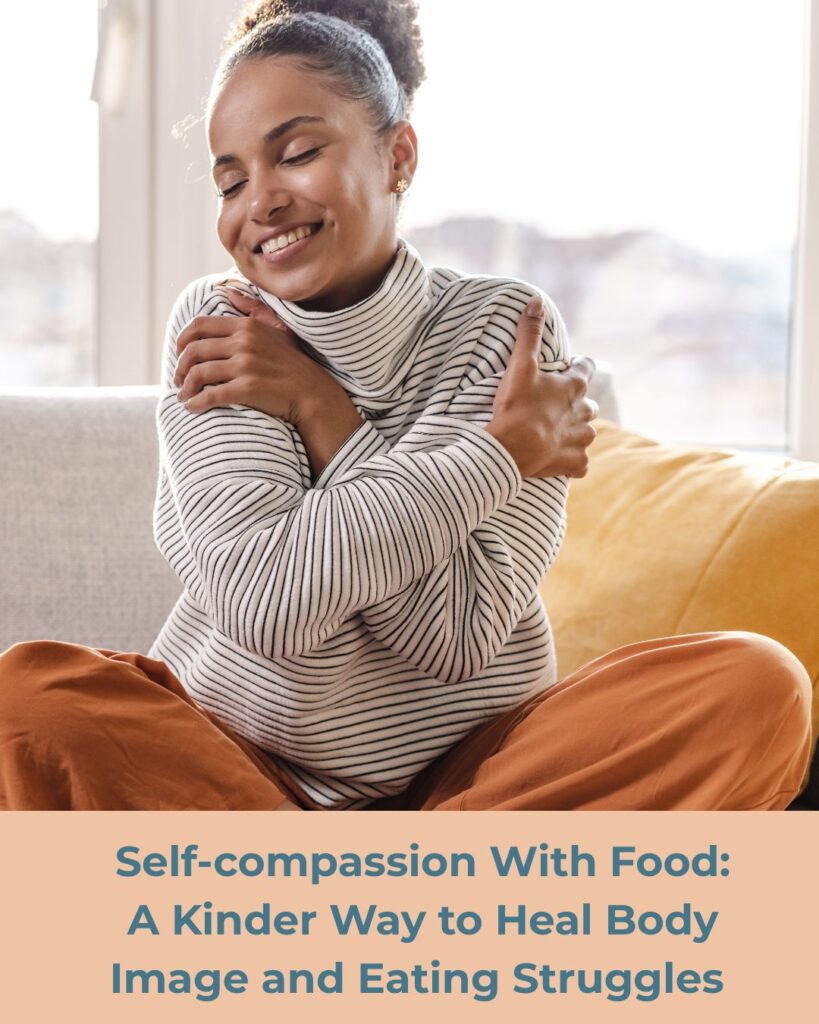Self Compassion with Food: A Kinder Way to Heal Body Image and Eating Struggles
June 17, 2025

Self Compassion with Food: Why It Matters
A few weeks ago, a client looked at me and said, “I was so bad this weekend. I had pizza, skipped my workout, and then spent hours picking apart my body in the mirror. I know better—I just don’t know why I keep messing up.”
Her words weren’t really about the pizza or the missed workout. They were about shame, disappointment, and the quiet belief that her worth is tied to eating a certain way or looking a certain way. This kind of inner dialogue is heartbreakingly common—and it shows just how hard it can be to offer ourselves compassion when it comes to food and body image.
What most people need in these moments isn’t another plan or rulebook. They need self compassion with food—the kind of support that helps you meet tough moments with gentleness instead of judgment.
At the root of so many struggles with food and body is the inner critic—that voice in your head that says things like:
- “You shouldn’t have eaten that.”
- “You should be more in control.”
- “You shouldn’t look like this.”
These “shoulds” come from years of diet culture, perfectionism, and unrealistic expectations. And while they may sound like they’re trying to help, they often leave us feeling ashamed, stuck, and disconnected from our bodies.
What Is Self Compassion?
Psychologist and researcher Dr. Kristin Neff, a pioneer in the field of self-compassion, defines it as offering yourself the same kindness and understanding you’d offer a good friend—especially when you’re struggling.
Self-compassion isn’t about making excuses or avoiding accountability. It’s about responding to yourself with care instead of criticism. According to Dr. Neff, self-compassion is made up of three key components:
- Self-Kindness – Choosing to be gentle and supportive with yourself, rather than harsh or self-critical
- Common Humanity – Remembering that you’re not alone; everyone struggles, and being imperfect is part of being human
- Mindfulness – Noticing your thoughts and feelings without judgment or avoidance
Practicing self-compassion can help shift how you relate to food, your body, and yourself—especially when things feel tough.
When your inner critic starts shouting “should,” self-compassion helps you pause and ask:
“Is this voice helping me feel supported—or making me feel worse?”
A Real-Life Example: Bad Body Image Days
Let’s say you’re getting dressed and nothing feels quite right. That familiar inner critic shows up:
“Why do I look like this? I should have lost weight by now. I can’t go out like this.”
Instead of spiraling into shame, self compassion with food and body image might sound like:
💭 Self-kindness: “This is a hard moment. I’m feeling uncomfortable—and I deserve gentleness.”
💭 Common humanity: “Lots of people feel this way. I’m not the only one.”
💭 Mindfulness: “I notice these ‘should’ thoughts. I don’t have to believe everything they say.”
You may still feel tender—but you’re no longer in a war with yourself. You’re meeting the moment with care.
What Self Compassion with Food Looks Like
The inner critic doesn’t just show up in the mirror—it also shows up at the table.
Maybe you emotionally eat, and the voice says:
“You shouldn’t have done that. You always mess up.”
Or you eat past fullness, and it whispers:
“You have no control.”
Instead of punishing yourself or doubling down on restriction, self compassion with food helps you respond differently:
- “I was feeling overwhelmed. What support did I really need in that moment?”
- “I ate more than I needed—but that doesn’t make me bad or broken.”
- “What would feel helpful now, not harmful?”
This shift from judgment to curiosity softens the inner critic and creates space for healing.
Try This: A 3-Step Self Compassion Check-In
When your inner critic is loud, try this simple practice:
- Pause and name the voice.
“That’s my inner critic. It’s saying I ‘should’ be doing something differently.” - Offer kindness.
“This voice is trying to protect me, but it’s not helping right now.” - Respond with care.
“What do I really need in this moment?”
Sometimes the answer is rest, connection, movement, or nourishment. It’s rarely more self-criticism.
Final Thoughts: The Antidote to “Should” is Self-Compassion
The voice of “should” is loud. But there’s another voice inside you—the one that knows how to care, soothe, and support.
You don’t have to earn your worth through food choices.
You don’t have to fix your body to deserve kindness.
And you’re not a failure for struggling.
Self compassion with food allows you to step off the shame spiral and into something much more powerful: trust, softness, and lasting change.
At Rhonda Krick Nutrition, I support clients in quieting the inner critic and building a new relationship with food and body—one rooted in self-trust, not self-blame.
P.S. Want to stop “should-ing” yourself and start feeling more at peace with food? Book a free discovery call , follow me on instagram, or join my email list for weekly support and insight.
Leave a Reply Cancel reply
home
about
services
Resources
contact
Rhonda@Rhondakrick.com
(310) 721-2260
//
//
//
//
Forget diets. Find freedom with food, peace with your body, and joy in your life.
//
design by morgan sinclair designs
//
privacy policy
calabasas, CA + virtual
Stay connected!
Signup for the Rhonda Krick Nutrition newsletter to stay connected and informed about all things Antidiet and Intuitive Eating!
Thank you!
You have successfully joined our subscriber list.